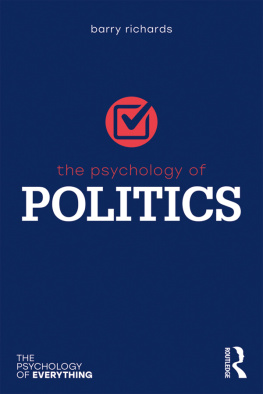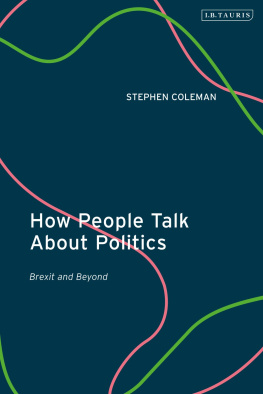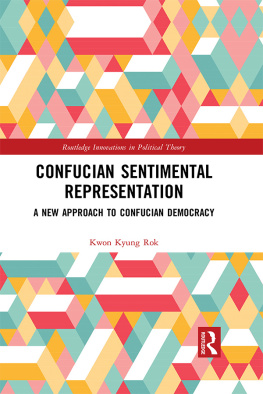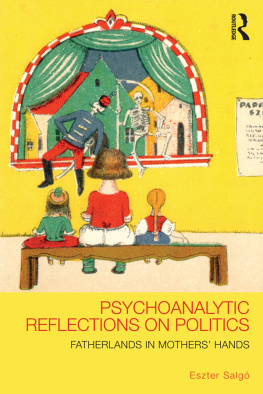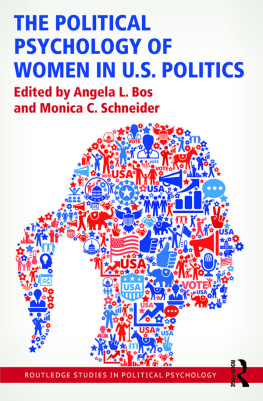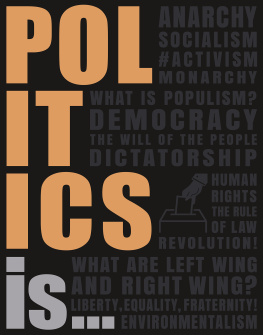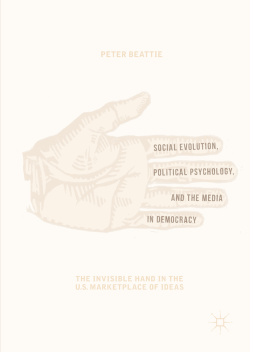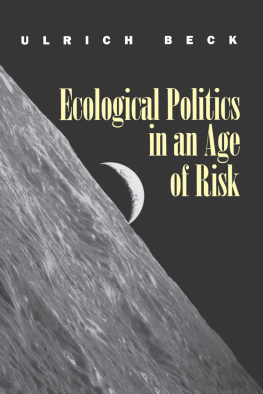The Psychology of Politics
How do some political leaders capture popular support? What is the appeal of belonging to a nation? Can democracy thrive?
The Psychology of Politics explores how the emotions which underpin everyday life are also vital in what happens on the political stage. It draws on psychoanalytic ideas to show how fear and passion shape the political sphere in our changing societies and cultures, and examines topical social issues and events including Brexit, the changing nature of democracy, activism, and Trump in America.
In a changing global political climate, The Psychology of Politics shows us how we can make sense of what drives human conduct in relation to political ideas and action.
Barry Richards is Professor of Political Psychology in the Faculty of Media and Communication at Bournemouth University.
The Psychology of Everything
People are fascinated by psychology, and what makes humans tick. Why do we think and behave the way we do? Weve all met armchair psychologists claiming to have the answers, and people that ask if psychologists can tell what theyre thinking. The Psychology of Everything is a series of books which debunk the popular myths and pseudo-science surrounding some of lifes biggest questions.
The series explores the hidden psychological factors that drive us, from our subconscious desires and aversions, to our natural social instincts. Absorbing, informative, and always intriguing, each book is written by an expert in the field, examining how research-based knowledge compares with popular wisdom, and showing how psychology can truly enrich our understanding of modern life.
Applying a psychological lens to an array of topics and contemporary concerns from sex, to fashion, to conspiracy theories The Psychology of Everything will make you look at everything in a new way.
Titles in the series:
The Psychology of Grief
Richard Gross
The Psychology of Sex
Meg-John Barker
The Psychology of Dieting
Jane Ogden
The Psychology of Performance
Stewart T. Cotterill
The Psychology of Trust
Ken J. Rotenberg
The Psychology of Working Life
Toon W. Taris
The Psychology of Vampires
David Cohen
The Psychology of Chess
Fernand Gobet
The Psychology of Music
Susan Hallam
The Psychology of Weather
Trevor Harley
The Psychology of Driving
Graham J. Hole
The Psychology of Retirement
Doreen Rosenthal and Susan M. Moore
The Psychology of School Bullying
Peter Smith
The Psychology of Conspiracy Theories
Jan-Willem van Prooijen
The Psychology of Addiction
Jenny Svanberg
The Psychology of Fashion
Carolyn Mair
The Psychology of Gardening
Harriet Gross
The Psychology of Gender
Gary Wood
The Psychology of Climate Change
Geoffrey Beattie and Laura McGuire
The Psychology of Celebrity
Gayle Stever
The Psychology of Dog Ownership
Craig Roberts and Theresa Barlow
The Psychology of Social Media
Ciarn Mc Mahon
The Psychology of Happiness
Peter Warr
The Psychology of Politics
Barry Richards
The Psychology of the Paranormal
David Groome
For further information about this series please visit
www.thepsychologyofeverything.co.uk
The Psychology of Politics
Barry Richards

First published 2019
by Routledge
2 Park Square, Milton Park, Abingdon, Oxon OX14 4RN
and by Routledge
52 Vanderbilt Avenue, New York, NY 10017
Routledge is an imprint of the Taylor & Francis Group, an informa business
2019 Barry Richards
The right of Barry Richards to be identified as author of this work has been asserted by him in accordance with sections 77 and 78 of the Copyright, Designs and Patents Act 1988.
All rights reserved. No part of this book may be reprinted or reproduced or utilised in any form or by any electronic, mechanical, or other means, now known or hereafter invented, including photocopying and recording, or in any information storage or retrieval system, without permission in writing from the publishers.
Trademark notice: Product or corporate names may be trademarks or registered trademarks, and are used only for identification and explanation without intent to infringe.
British Library Cataloguing-in-Publication Data
A catalogue record for this book is available from the British Library
Library of Congress Cataloging-in-Publication Data
A catalog record has been requested for this book
ISBN: 978-1-138-55167-1 (hbk)
ISBN: 978-1-138-55170-1 (pbk)
ISBN: 978-1-315-14769-7 (ebk)
Typeset in Joanna
by Apex CoVantage, LLC
Contents
The heart has its reasons, of which reason knows nothing.
(Blaise Pascal, Thoughts, 1670)
Our psychological era
By the end of the last century, it had become clear that, in many countries around the world, we were living in a psychological era. Psychology had become one of the most popular subject choices amongst university students, and it had become normal in many theatres of everyday life to take an interest in psychological issues. What is this person feeling? Why is that person behaving like that? How are we affected by different sorts of experience? Can people really change themselves? Not everyone thinks that the trend towards asking such questions is a good thing, and indeed it is not always done in good ways. We will touch on some of the current debates later in the book. But overall, there are many reasons to welcome this major shift in our culture, which we can see as laying the basis for growth in our collective reserves of self-understanding, sensitivity, resilience and above all concern for others. We will use the term emotional capital to refer to these shared assets, which are of great importance to the future of our societies.
Yet despite the growing influence of psychology in education, in some professions and in popular culture, it has had little impact on politics on how we understand politics, let alone on political practices. The turn to psychology is happening differently in different areas of life. It happened very quickly in some areas of popular culture, where there were pre-existing preoccupations with romantic love and family life. In politics, however, we may readily assume that economic interests and military strength are the ultimate forces at work, and that they leave little room for our psychologies to influence events. Also, amongst academics and other intellectuals, the desire to hold on to un-psychological explanations of human behaviour has been particularly strong when it comes to politics.
Take, for example, the idea that our voting choices are primarily based on the state of the economy, and so are determined by our calculations of which party or candidate would be best for our individual economic self-interest: Under which party would I be best off? This model of the citizen as a rational homo economicus may sometimes capture one element in the mix of factors determining some peoples electoral decisions, but it is of no use as a theory of how democracy works psychologically. Other broader models of the individual, which weigh up more complex issues than economic self-interest, may still rely on an underlying conception of the citizen as a fundamentally rational agent, untroubled by any tumult of feeling. This rationalistic approach cannot dig deeper into the emotions which are often fundamental to voting choices, and to other political behaviours, and which need to be understood psychologically. Despite the growing interest in emotion across the social sciences in recent decades, the continuing influence of the old philosophical tradition of rationalism has slowed the development of a fully psychological approach to understanding politics, inside and outside academia. We remain impressed by the certainty of Its the economy, stupid.

